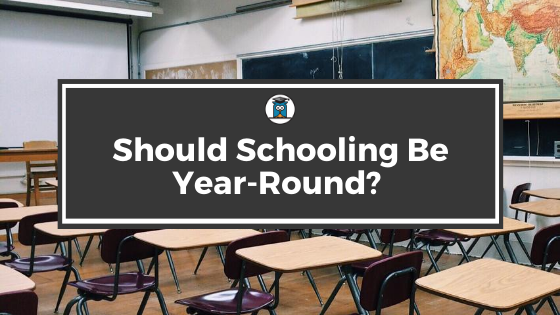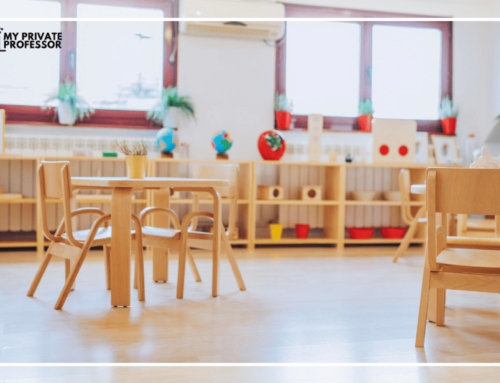By Katherine McCarthy,
When kids think of summer, one of the first things that often comes to their mind is the absence of school. Summer is associated with warm weather, beach days, picnics and of course in this modern era, more time for video games.
However, this isn’t exactly true for all kids. Many attend summer school or take summer classes. Activities like these can help prevent learning loss over summer break, which is commonly known as the “summer slide”. This continuation of school over summer break, begs the question as to whether school should be year-round. I believe that school should ideally be year-round. However, I recognize that there are some issues with that, and I would more firmly argue that at a minimum, some form of education — such as reading, writing or math exercises — should occur year-round. There are many ways for education to continue all year round and year-round schools are merely just one of those ways.
When students stop thinking about and exercising the skills that they learned during the school year over long summer breaks, they begin to forget some of those materials and skills. Consequently, when they return back to school in the fall, they need more time to review and even relearn many of the things that they learned the previous year. I’ve personally experienced this myself in several different classes after returning to school in the fall. Struggling with a problem that you used to know how to do in about 30 seconds is one of the most frustrating feelings. If schools were to run year-round, there wouldn’t be so much time wasted on relearning lost knowledge. Many students would be more productive.
Having school all year-round does have its pitfalls though. Students would not have as much time to spend with family & friends during the summer. Many families go on vacations together in the summer. Students wouldn’t be able to enjoy the warm weather and do summer activities. Additionally, summer can be a time for students to rest a bit before another busy school year begins. Having school all year round wouldn’t give students a break to recuperate. They may become tired enough to the point that they’re unproductive and unmotivated. This would essentially negate the benefits of having school all year round. Thus, while I still think that having school all year-long would be ideal, I can see and understand that it might not be very feasible for some students and families.
Some of the problems with year-round school are solved by giving students frequent short breaks throughout the year. This still allows students to have time off for family and other activities. This may be sufficient enough to satisfy some students and families, but it probably won’t work for all. There are still drawbacks such as the fact that the student wouldn’t be able to attend events like a summer travel program or internship. Because breaks are short, if the student wants to visit family that live far away, they either can’t stay very long or the travel costs back and forth will become expensive. There is also the student’s learning style preference to be considered. In other words, a year-round school may not work best for every student. School and student compatibility is key.
If year-round schools aren’t compatible with the student’s life or learning styles, there are still good opportunities for students to continue their education year long. Students can still learn and make academic progress over school breaks without attending their traditional school all year long. Summer classes can be a great way to continue learning when school’s out because the teacher usually sets a schedule and you are sure to learn something. Additionally, a summer class doesn’t have to consume the entire summer. Just taking one class is significant enough and many are online, which makes it easy for the student to still make summer plans. In high school, I remember taking a biology class online for leisure and the following school year, I felt more prepared for my classes since I had been reading and learning over the summer break. However, simple activities, such as a reading or math schedule can make a noticeable difference. When I was learning French, I remember being assigned some reading and writing assignments to do over the summer. It wasn’t a massive overload of work, but when I returned in the fall, I felt that I had actually learned a lot over the summer rather than losing knowledge.
The only issue is that summer learning efforts aren’t very widespread at all traditional schools. Some teachers already assign summer homework, however this practice could certainly be made more widespread and applied to younger students as well. Until that happens though, students and parents can still make their own educational schedules for school breaks.
These days, there are many resources for students to continue their education outside of school.
- Books, ebooks and audiobooks are easily available online and at libraries. Even some newspaper articles can be great short pieces to read and keep up with current events. Personally, I find that books and ebooks are more conducive to learning, though audiobooks work great if you’re learning a new language or are short on time.
- Math practice books can be purchased for reasonable prices at bookstores, and if students have class workbooks that they don’t finish during the school year, they can finish them over the summer.
- Both online tutoring and in-person tutoring can be beneficial for catching up, getting ahead or as supplemental instruction. My Private Professor is a great source that’s based in Irvine and offers both online and in-person tutoring from current college students or recent college graduates. I’ve used online tutoring in the past for a couple AP courses. Sometimes it helps to hear concepts explained in a slightly different way than your teacher/textbook. Other times, I find that just spending extra time discussing concepts or problems helps me understand material better.
- Youtube has many educational channels that cover a wide array of topics and are free. I usually find them helpful for reviewing material.
- Summer classes are available at learning centers and colleges. For older students, many community college courses are free to high school students. I’ve taken a few courses and found them helpful because in addition to learning, the classes also give you experience with community college level classes.
In sum, maintaining educational activities year-round is certainly the priority and can be done in several ways. I think that the most important concern is making sure that learning occurs year-round — whether it be through a year-round school or a traditional school plus educational activities over the summer. I would advocate that both more year-round schools be established and that better systems be put in place at traditional schools so that students continue learning and working on their education all year round. This way, students and parents have some degree of choice as to how the student can work on getting an education and maintaining it year-round.
What do you think about year-round schools? Do you think more schools should become year-round?
Katherine McCarthy is a member of the University of California, Irvine’s Chem Club & an ambassador to My Private Professor, which provides individualized online & in-person tutoring to students in all subjects, including K-12 math, science, language arts, history, foreign language, AP exams, test prep, essays, & college counseling, by top tutors from top universities. www.myprivateprofessor.com







